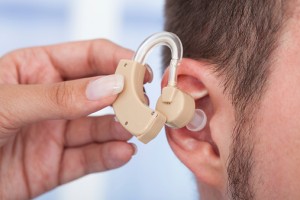

 Rheumatoid arthritis can cause hearing loss due to multiple factors, according to a new study. Rheumatoid arthritis affects nearly one percent of the population, and hearing loss prevalence in rheumatoid arthritis is between 25 and 72 percent. The most common type of hearing loss in rheumatoid arthritis is sensorineural hearing loss, which includes synovial destruction of incudostapedial and incudomalleolar joints, rheumatoid nodules, auditory neuropathy, destruction of the cochlear hair cells, and drug-induced ototoxicity. The study uncovered an increased risk of hearing impairment in senior patients and patients with long disease duration, active disease, seropositivity, elevated acute phase reactants, and rheumatoid nodules.
Rheumatoid arthritis can cause hearing loss due to multiple factors, according to a new study. Rheumatoid arthritis affects nearly one percent of the population, and hearing loss prevalence in rheumatoid arthritis is between 25 and 72 percent. The most common type of hearing loss in rheumatoid arthritis is sensorineural hearing loss, which includes synovial destruction of incudostapedial and incudomalleolar joints, rheumatoid nodules, auditory neuropathy, destruction of the cochlear hair cells, and drug-induced ototoxicity. The study uncovered an increased risk of hearing impairment in senior patients and patients with long disease duration, active disease, seropositivity, elevated acute phase reactants, and rheumatoid nodules.
Environmental factors can affect hearing impairment as well, and smoking, alcohol, and noise can aggravate the condition. Long-term exposure to alcohol can negatively affect rheumatoid arthritis, too.
Treatment of hearing impairment in rheumatoid arthritis is essential. Treatment options include oral steroids and intensifying Disease-Modifying Antirheumatic Drugs. Antioxidants may also be beneficial for ear protection, and regular hearing tests are essential to monitor any changes. Lastly, hearing impairment can be successfully managed with hearing aids along with lifestyle changes like quitting smoking, minimizing alcohol consumption, and reducing noise.
Studies have shown higher rates of hearing loss among rheumatoid arthritis patients, so it’s not an uncommon problem. But the link between the two may have more to do with rheumatoid arthritis treatments rather than the ears. A 2012 study published in The American Journal of Epidemiology found that women who took ibuprofen (Advil, Motrin) or acetaminophen (Tylenol) at least two days per week were more likely to report hearing loss than those who rarely took the painkillers. Researchers suspect these types of drugs reduce blood flow to the ears thus contributing to hearing impairment.
Additionally, the longer hearing impairment is left untreated, the worse the consequences can be. Many studies have tied hearing impairment to cognitive decline, so the longer treatment is delayed the worse it is for your mind.
Some tips to live with hearing impairment in rheumatoid arthritis include letting those around you know of your hearing impairment so they can make adjustments, testing out hearing aids to see which ones work best for you, speaking louder prompting others to speak up as well, positioning yourself in such a way that you can hear other people better, and, lastly, taking it easy as there are many individuals, especially elderly, who have some level of hearing impairment.
Copyright © www.orthopaedics.win Bone Health All Rights Reserved